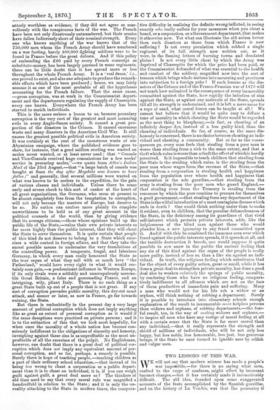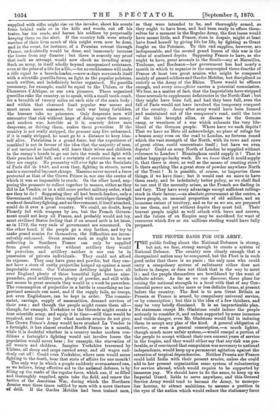TWO LESSONS OF THIS WAR.
WE will not say that modern science has made a people's war impossible,—for there is no saying what men, exalted to the verge of madness, might effect by incessant bayonet charges,—but it has certainly made it inconceivably difficult. The old idea, founded upon some exaggerated accounts of the feats accomplished by the Spanish guerillas, and on the history of La Vendee, was that the peasantry if
aupplied with rifles might rise on the invader, shoot his scouts from behind walls or in the hills and woods, cut off his trains, bar his roads, and harass his soldiers by perpetually keeping them on the alert. If the country folk were utterly careless of their lives much of this might even now be done, and in the event, for instance, of a Prussian retreat through France, undoubtedly would be done, and immensely increase the losses from any disaster ; but there is scarcely any proof that such an attempt would now check an invading army. Such an army, in itself wholly beyond unorganized resistance, even at the price of a life for a life,—for no recklessness will make a rifle equal to a breech-loader,—now-a-days surrounds itself with a scientific guerilla force, as light as the popular pelotons, much swifter, and indefinitely better organized. No guerilla yeomanry, for example, could be equal to the Chiang, or the Chasseurs d'Afrique, or our own pioneers. These organized guerillas rake the country, so to speak, with a small tooth comb, for a breadth of twenty miles on each side of the main body ; and within that charmed limit popular war means and must mean mere massacre, for such war being forbidden, the hussars take no prisoners. Only desperate men will encounter that risk without hope of doing more than annoy, and modern war, horrible as it is, scarcely drives men desperate, or driving them, makes them powerless. If the country is not really stripped, the peasant may live unharmed, if it is really stripped, he must go to a distance to keep him- self alive. Patriotism is a grand force, but the experience of mankind is not in favour of the idea that the majority of men, if not tortured or insulted, will leave their wives and children in the enemy's hands to go out into the woods and fight with their pouches half full, and a certainty of execution as soon as they are empty. No peasantry will ever fight as the Socialists of Paris did in 1848, and even they, fighting in streets, never made a successful bayonet charge. Massena never moved a force protected as that of the Crown Prince is, nor one the centre of which it was so impossible to reach. On the other hand, sup- posing the peasants to collect together in masses, either as they did in La Vendee, or in a still more perfect military order, what are they to do ? Supposing they all had breech-loaders, only a Government could keep them supplied with cartridges through weeks of desultoryfighting, and no Government, if itself attacked, could do it over a great country. We could, no doubt, keep Picardy fed with weapons by sea, but the French Govern- ment could not keep all France, and probably would not try, most civilized States feeling that if an armed mob is let loose, as in 1792, the very ends of government are renounced. On the other hand, if the people go a step farther, and try to make grand armies for themselves, the difficulties are incon- ceivably enhanced. Great armies such as ought to be now collecting in Southern France can only be supplied from great arsenals, for without artillery they would be powerless, and artillery neither is nor can be in possession of private individuals. They could not afford its expense. They may have guns and powder, but they can- not have a store of costly projectiles heaped up against a most improbable event. Our Volunteer Artillery might have all over England plenty of those beautiful light bronze nine- pounders, good artillerymen, plenty of powder, and still with- out access to great arsenals they would in a week be powerless. The consumption of projectiles in a battle is something no im- provised arsenals can meet, and if the supply fails, no troops, not even Englishmen, can be kept in order. The commis- sariat, carriage, supply of ammunition, demand services of their own ; and though the people might create them all— though, for example, Yorkshire or the Gironde might create a true scientific army, and equip it in time—still time would be required, and time is just what modern armies do not give. The Crown Prince's Army would have crushed La Vendee in a fortnight, it has almost crushed North France in a month, while it is doubtful whether in a country under modern con- ditions a fortnight's fighting would not involve losses the population would never bear ; for example, the starvation of all women and children. Imagine Yorkshire traversed by Valens, all sheep and crops carried away, and all wages sud- denly cut off l Could even Yorkshire, where men would mean fighting to the death, bear that state of affairs for one month?
The only way in which a people suddenly overmastered can, as we believe, bring effective aid to the national defence, is by filling up the ranks of the regular force, which can, if so filled and thoroughly supplied, again take the field, and renew the tactics of the American War, during which the Northern Armies were three times refilled by men with a mere tincture cif drill. If the Gardes Mobiles had been trained men, as they were intended to be, and thoroughly armed, as they ought to have been, and had been ready to efface them- selves for a moment in the Regular Army, the first losses would have meant little, and France, risen in despair, might at least have freed herself by giving life for life, by fighting as Grant fought on the Potomac. To this end supplies, however, are indispensable, and the second grand lesson of this war is the value of scattered depots. Supposing France to have, as she ought to have, great arsenals in the South—say at Marseilles, Toulouse, and Bordeaux—her government has had nearly a. month in which to organize in the unoccupied three-fourths of France at least two great armies, who might be composed mainly of passed soldiers and Gardes Mobiles, but disciplined as strictly as the Army of the Rhine. There would be officers enough, and every sous-officier carries a potential commission. We fear, as a matter of fact, that the Imperialists have stripped- these arsenals to supplement deficiencies in the North-East ; but- they might have been full, and had they been full, even the- fall of Paris would not have involved the temporary conquest of the country. Army after army would have been formed and maintained out of the conqueror's road, until the turn of the tide brought allies, or disease to the German camp, or weariness of a war which exhausts the very life- blood of the German people. Where have we such depots ?' That we have no Metz all acknowledge, no place of refuge for a beaten army even on the road to London, no fortress round which the vast strength of the North, with its rows and rows- of great cities, could concentrate itself ; but have we even depots? Could an army North of London be supplied without reference to London ? Birmingham could supply it ? That is. rather happy-go-lucky work. Do we know that it could supply it, that there is store, as well as the means of creating store ?- Is there anything like a great store of powder anywhere North of the Trent ? It is possible, of course, to improvise these things, if we have time ; but it would cost no more to have them ready, and be indefinitely better policy, as we shall find to our cost if the necessity arises, as the French are finding in sad fury. They have every advantage except sufficient rolling- stock in their favour,—an absolute government at the centre, a brave people, an unusual proportion of old soldiers, and an immense extent of territory, and so far as we see, are prepared to use them, and yet without depots they must fail. Their bravest people might as well attack with bows and arrows, and the future of an Empire may be sacrificed for want of resources which five or six millions sterling would have fully prepared.































 Previous page
Previous page